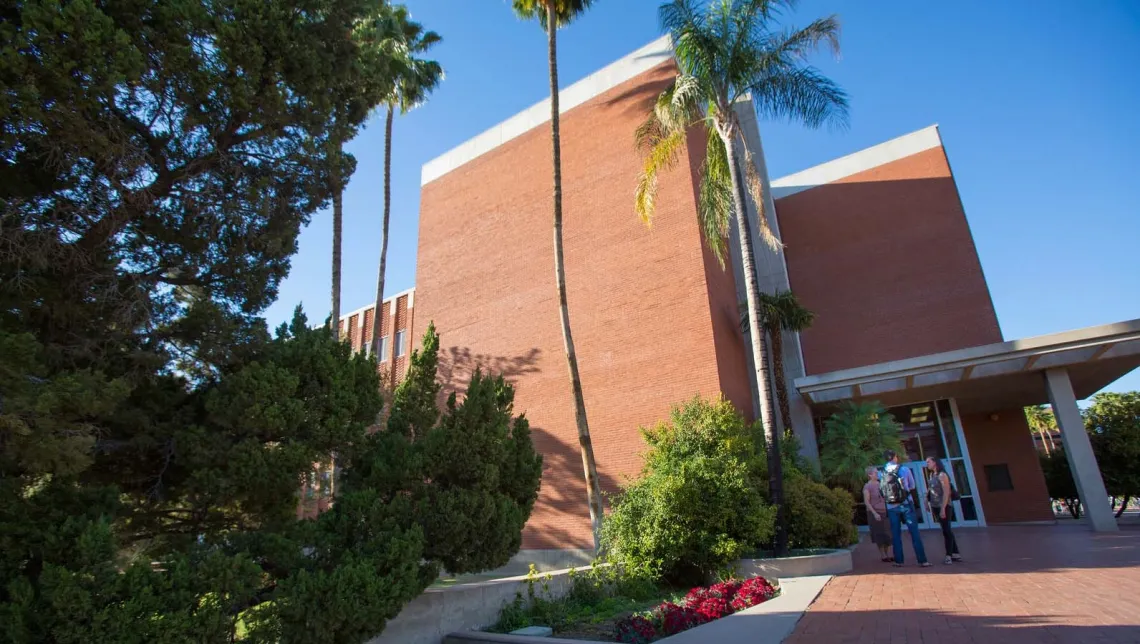
Our Department
It has been more than 80 years since the first University of Arizona Speech Clinic was established. We became a department in 1971, and the University of Arizona quickly emerged as a national leader in the fields of speech-language pathology, audiology, and the sciences that support these clinical professions.
We are part of the School of Mind, Brain and Behavior in the College of Science where the opportunity for interdisciplinary coursework and research provides a rich experience for undergraduate and graduate students. Our faculty has a long tradition of leadership at the national and university level, reflected by many honors and awards.
Welcome from Department Head Mary Alt
Since 2002, the department has bestowed the Distinguished Alumnus Award to individuals who have made a difference in the science and the practice of speech-language pathology or audiology. Recipients graduated with a BS, MS or PhD at least 5 years prior to their nomination, and have demonstrated sustained and active participation in the profession.
The Jean R. Guloien Award is awarded each year to outstanding graduate students at our spring commencement ceremony. Read about Jean and see awardee list.
Our Vision
Our vision is to be a premier university program in Speech, Language, and Hearing Sciences, providing international leadership in research, excellence in education and clinical training, and service that advances the field and improves the lives of individuals with communication disorders.
Our Mission
The mission of the Department is to contribute to the scientific study of human communication and its disorders, to educate students regarding the relevant knowledge and skills necessary for clinical and research endeavors in the field, and to provide service to the university, community, state, and beyond.
Our Strategic Plan
Our Strategic Plan for 2022-2026 focuses on five areas: 1) To recruit, mentor, and retain strong, diverse faculty, and enhance the infrastructure for excellence in teaching and research; 2) To provide exemplary education programs that prepare the next generation of scientists, clinicians, educators, and leaders in the field of communication sciences; 3) To conduct state-of-the-art basic, translational, and clinical research in communication sciences and disorders; 4) To enhance access to culturally competent, evidence-based clinical care for people with communication needs; 5) To engage in outreach activities that directly benefit professional colleagues, students, and individuals and their families in the community. These strategic priorities will be addressed through leadership and initiatives that engage faculty committees, professional staff, and department head/associate heads.
Overarching Goals of the Department
The overarching goals of the Department fall into the domains of research, teaching, and outreach/social impact.
Research
- To pursue an understanding of the complexities of communication sciences and disorders and translate foundational knowledge to enhancement of clinical care
Teaching
- Undergraduate education
- To provide high quality education in speech, language, and hearing sciences
- To prepare students to succeed in a variety of careers through the application of critical thinking and written and oral communication skills
- To prepare students to interact respectfully with people with disabilities/disabled people and treat those with communication disorders with empathy
- Graduate education
- To train highly qualified audiologists and speech-language pathologists who are well-grounded in principles of evidence-based practice
- To instill professionalism in our students, so they demonstrate integrity, compassion, inclusion, excellence, and strong communication skills in their practices
- To train students to become leaders within their professional communities
- To prepare the next generation of ethical scientists in our professions
Outreach and Social Impact
- To advance the quality and accessibility of evidence-based, culturally-competent clinical care for people with communication needs in Tucson, Arizona, the nation, and international contexts
- To educate the public regarding the science and clinical aspects of human communication and its disorders
- To engage in outreach activities and inform public policy to directly benefit professional colleagues, students, and individuals and their families in the community
OUR VALUES:
Our Departmental Values overlap the U of A’s university-wide values:
INTEGRITY – Be honest, respectful, and just
COMPASSION – Choose to care; prioritize wellness
INCLUSION – Harness the power of diversity; strive for belonging
EXPLORATION – Be insatiably curious; love learning
And we have some values specific to our department:
EXCELLENCE – Strive for the best while incorporating the preferences and values of the community
COMMUNICATION- Connect with those around you (both near and far)
A foundational theme that runs through all of these values for our Department is that of service. We are here to serve our students, clients/patients, and our community.
The Department of Speech, Language, and Hearing Sciences is committed to creating and maintaining an environment free of discrimination -- in the classroom, the clinical setting, and the workplace. The University of Arizona Office of Institutional Equity provides education and support for these efforts.
The University of Arizona is an equal opportunity, affirmative action institution. The University prohibits discrimination in its programs and activities on the basis of race, color, religion, sex, national origin, age, disability, veteran status, sexual orientation, gender identity, or genetic information and is committed to maintaining an environment free from sexual harassment and retaliation.

